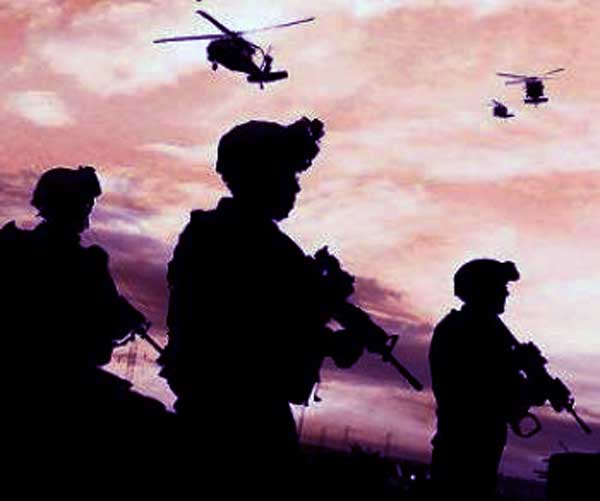One of the enduring mysteries of US Foreign Policy was the shift of focus of the George W Bush Administration from destroying Al-Qaeda in Afghanistan to acting against the Saddam regime in Iraq, consequences of which continue to reverberate even to this day. There is substantial evidence to suggest that it was the US occupation of Iraq and the subsequent events there that accelerated the rise of Abu Bakr al-Baghdadi, the Iraqui radical leader who calls himself the Caliph of Daesh, or the Islamic State of Iraq and Levant, as some know it. Worse, this shift in focus was also one of the key factors that led to the defeat of the United States and its allies in both the Iraqui and Afghan campaigns, suggestions to the contrary notwithstanding.
…entire intelligence community was caught flat-footed, despite the immense resources available, but also for their inability to assess what would happen next, an all-consuming fear of where and when the next attack would come.
Moreover, the unwillingness and inability of the United States and its Western Allies to put boots on the ground to confront Daesh, without which its defeat seems unlikely, can again, be directly blamed on the course of the earlier campaigns.
Over the years many reasons have been advanced for this shift of focus, from Saddam acquiring Weapons of Mass Destruction (WMD), protecting the oil interests of the Corporates, untrammelled greed on the part of Military Contractors with links to the White House and to it being the unfinished agenda of the earlier Bush Administration and the First Gulf War. Undoubtedly, all of these may well have been factors in the decision to unseat Saddam, but certainly they do not explain the US Administrations’ axing its own feet, especially given the emotive appeal of the initially successful campaign in Afghanistan among the general population within the country following 9/11. True, President Bush’s approval ratings did suffer six months on, given that after the initial successes, none of the architects of the outrage, Osama Bin Laden, Ayman-al-Zawahiri or Mullah Omar, the one-eyed Taliban leader, had been apprehended or killed. Reason enough for focusing on another member of the Axis of Evil to divert public attention from the slow progress in the war on terror.
Ron Suskind’s fascinating and incisive account of the Bush Administrations’ response to the 9/11 outrage “The One Percent Doctrine: Deep Inside American Pursuit of its Enemies Since 9/11” (Simon & Schuster) gives a contrarian perspective on the issue and adds to our understanding to subsequent events and the US Government’s response to a threat it had never been confronted with before. The hypothesis he suggests is simplicity itself.
The events of 9/11 were debilitating not only because the entire intelligence community was caught flat-footed, despite the immense resources available, but also for their inability to assess what would happen next, an all-consuming fear of where and when the next attack would come. Actions of every branch of government were subsequently driven by the twin mantras — that the political leadership had to be shown as fully in control of the situation and the ever increasing burden of knowing that “failure is not an option”, a statement made famous about the ill-fated spaceship Apollo 13, in a movie of that name. Added to this was the increasing comprehension among the intelligence and security establishment that Mainland USA was indefensible from the myriad threats that it confronted.
…the manner in which the Bush Administration dealt with other lesser powers only showed up the US as bullies and added to the mistrust that has bogged US relations with countries in the Middle East and South Asia.
If all of this were not enough, there were confirmed reports of increasing attempts by radical elements to gain possession of WMD for targeting the US mainland, a nightmare scenario of overriding concern. Given these circumstances and facing increasing pressure to respond aggressively against this unprovoked attack led to the formulation of a policy that Suskind refers to as the Cheney Doctrine, first enunciated by Vice President Dick Cheney and subsequently articulated by President Bush himself. Its premise was “if there is even one percent of the unimaginable coming due, act as if it’s a certainty. It’s not about our analysis but about our response”. Evidence was no longer the prerequisite to action; in fact it was irrelevant and a pro-active aggressive response was everything.
It should, therefore, come as no surprise that based on the Cheney Doctrine, American response, both to foreign and domestic threats, was aggressive, robust and to some extent completely in violation of prevailing laws. For example, within the country over two thousand young Arab –Americans were arrested and either imprisoned or deported based on little or no evidence, such as that he may have shopped at the same store as one of the 9/11 hijackers or because he may have been taking flying lessons. Setting up of the detention facility at Guantanamo Bay to hold Islamic fighters without access to US judicial processes is another example. There can also be little doubt that the action against Iraq owes much to this doctrine.
While it may have led to some success, especially in ensuring that the US did not witness another major strike in the past decade and a half, it has by no means ensured that the threats faced have diminished. Instead, the rise of Daesh has certainly complicated the global geo-political environment and we are today confronting an even bigger challenge. Moreover, even the lone wolf attack in San Bernardino, California, may have its roots in the manner Muslim immigrants were targeted in the aftermath of 9/11. In addition the manner in which the Bush Administration dealt with other lesser powers only showed up the US as bullies and added to the mistrust that has bogged US relations with countries in the Middle East and South Asia.





